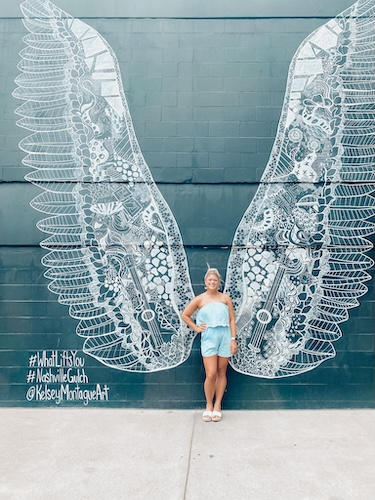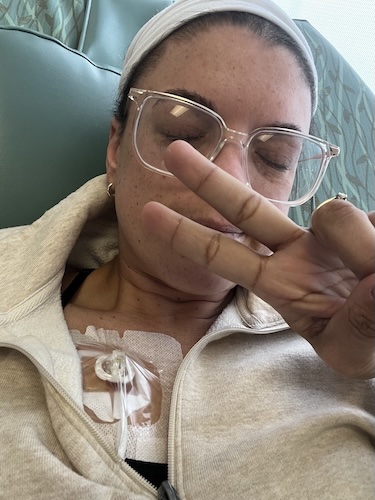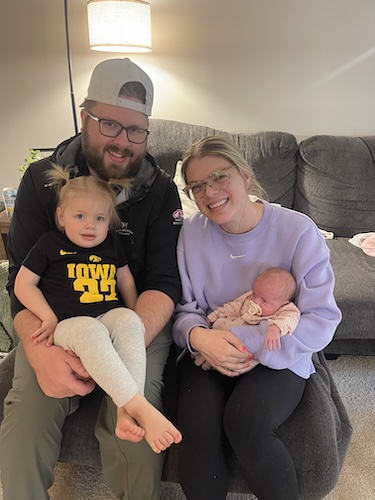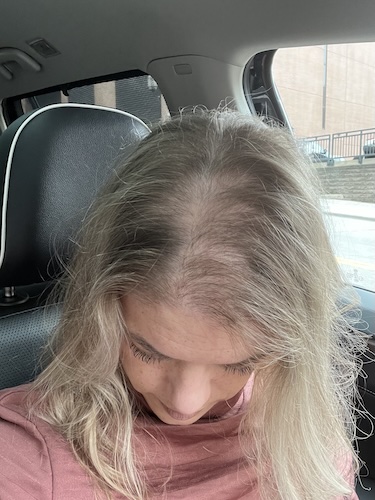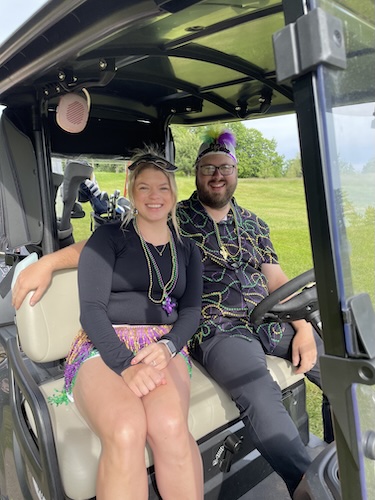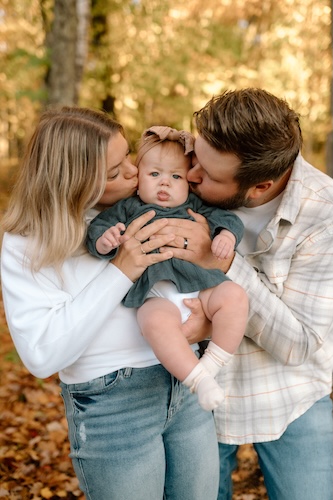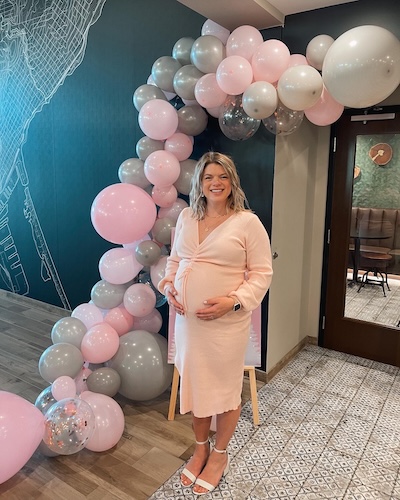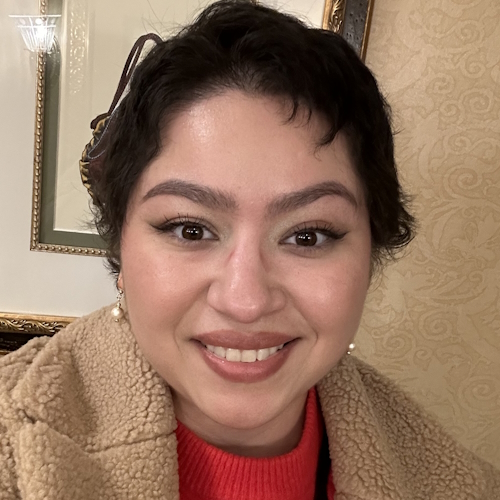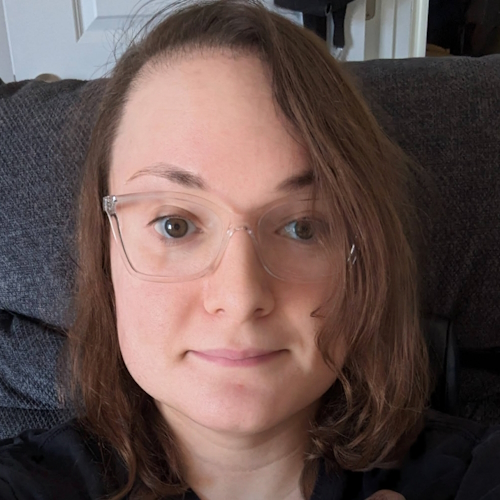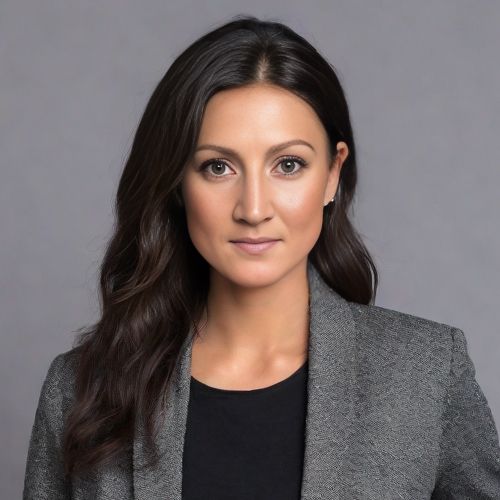“It Hit Me Like a Brick Wall”: Kailee’s Stage 4 Colorectal Cancer Story
Colorectal cancer during pregnancy is a rare and deeply challenging experience, one that Kailee knows about firsthand. Diagnosed at 34 while pregnant with her second child, Kailee’s experience challenges many assumptions about who colorectal cancer affects and what symptoms matter.
Interviewed by: Taylor Scheib
Edited by: Chris Sanchez
Kailee describes her earliest symptoms: a sensitive stomach she took as “normal,” bleeding during bowel movements (which she was told was likely due to hemorrhoids), and persistent fatigue. These signs intensified quickly during her second pregnancy and were accompanied by abdominal and back pain. Like many busy parents, she prioritized her family over her own symptoms, a decision she now reflects on with candor: “I put myself on the back burner, which I regret.”
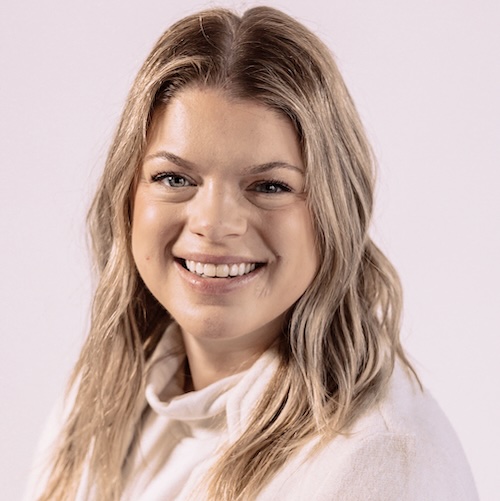
A turning point came through genetic testing for Kailee’s pregnancy, which led to unexpected results and concern from her care team. She was quickly referred for advanced genetic counseling and imaging, which ultimately revealed a mass in her colon and lesions in her liver and lungs. The diagnosis was advanced, stage 4 colorectal cancer, requiring urgent and complex decisions. Kailee credits her support network, her mother’s care, and her coach’s drive for helping her face the toughest treatment choices, such as pursuing chemotherapy while pregnant.
Throughout her colorectal cancer experience, Kailee’s resilience is anchored in sports, coaching, routine, family, and peer support. She continues treatment with hope, balancing motherhood, business ownership, and rounds of chemotherapy. Her reflections on positivity, advocacy, and adapting to life’s curveballs offer wisdom beyond medicine: “It’s a marathon, not a sprint. With positivity and perseverance, things can happen.”
Kailee’s story shines a light on the importance of listening to your body, advocating for yourself, and knowing that no one is ever truly alone with colorectal cancer. Watch her video above and browse the edited transcript of her interview below to learn about how:
- Listening to your body and not dismissing early symptoms can make a meaningful difference in seeking timely care
- Demanding answers and advocating for yourself in medical settings is essential, even if you have to push for multiple opinions
- Support from community, family, and peers deeply influences resilience during a colorectal cancer experience
- There is no “right” path for complex decisions during cancer, especially when parenting and family are involved
- Transformation is possible: Kailee’s experience shifted her focus from coaching youth basketball to embracing each day with her children
- Name: Kailee O.
- Diagnosis:
- Colorectal Cancer
- Staging:
- Stage 4
- Age at Diagnosis:
- 34
- Mutation:
- BRAF V600E
- Symptoms:
- Sensitive stomach, sometimes leading to vomiting after eating
- Bleeding during bowel movements
- Persistent fatigue
- Back pain
- Abdominal pain
- Anemia
- Significant symptom flare-up during second pregnancy
- Treatments:
- Surgery: colectomy
- Chemotherapy
- Targeted therapy
This interview has been edited for clarity and length. This is not medical advice. Please consult with your healthcare provider to make informed treatment decisions.
The views and opinions expressed in this interview do not necessarily reflect those of The Patient Story.
- My name is Kailee
- Navigating an athlete’s mindset after my stage 4 colorectal cancer diagnosis
- My early symptoms and missed signs
- My second pregnancy revealed that I had cancer
- The moment everything changed
- Navigating my colorectal cancer treatment options
- Life in active treatment
- Finding community and support
- Reflections on my colorectal cancer diagnosis and staying positive
- What I want others to know
My name is Kailee
I was diagnosed with stage 4 colorectal cancer.
So my grandpa, Bob McDonald, is a legendary basketball coach. He was from Chisholm, Minnesota. If anyone who has ever followed Minnesota basketball has heard of Chisholm, Minnesota, and their wonderful, amazing basketball teams, you go into their gymnasium and it kind of feels cozier. He was a coach there for over 50 years. He has over 1,000 wins. My dad, who is the oldest of six, also played basketball. My dad has three brothers and two sisters. They all played basketball, and they all also became coaches, following in the footsteps of my grandpa. My dad was the high school boys’ basketball coach in Cambridge, and still is. We grew up going to games. My mom will say that my siblings and I were all born on a game night. My dad coached and then would come to the hospital. I actually remember my younger brother being born because I was six years old; my dad brought us to the game, my mom was at the hospital, and we had the cheerleaders watch us until the game was over, then we went home. I ended up playing basketball at a young age. My brothers played in high school and actually played in college. I played four years of college basketball at UW-Superior. I loved every minute of it. It was a great experience. I can relate a lot of my life to being a college athlete. I think it prepared me a lot for what has happened in my life and set me up for success. It was a huge part of my life growing up.
After playing college basketball, I ended up coaching at a local high school. I coached there for 12 years. This will be my first season not coaching as an assistant coach, and I loved it. I loved giving back to the game, working with young females in our community. Being able to connect with them, teach them, and mentor them was really important and very fulfilling for me.
Navigating an athlete’s mindset after my stage 4 colorectal cancer diagnosis
When I was first diagnosed, it hit me like a brick wall. I never would have thought that at 34 years old I’d be dealing with this type of thing. Especially as a former athlete, you just kind of expect things to make sense with your body.
I knew something was wrong. I wasn’t feeling well, was tired all the time, and finally, getting that diagnosis kind of made sense of all the feelings I had. I was having pain I’d never felt before. I worked out my entire life and never felt pain like this.
At one point, it was relieving to get a diagnosis to explain what was happening. At another point, it was definitely emotional; something I wasn’t expecting and wouldn’t wish on anyone else.
My early symptoms and missed signs
I’ve always considered myself to have a sensitive stomach. That was my first symptom. I would eat certain foods, and my stomach wouldn’t agree with them. I’d need to use the restroom right away. I thought, “I need to eat better.” When I ate good things, I didn’t have those symptoms. Actually, when I was pregnant with my first child, I had some bleeding when passing bowel movements. As a first-time mom, my red flags were up with every symptom.
I called my OB’s hotline. They had me come in, checked me out, and said hemorrhoids are super common in pregnancy. I trusted my medical professionals and just accepted it. That bleeding continued, but I was busy, so I put myself on the back burner, which I regret.
When I was pregnant with my second, my symptoms really started flaring up. It felt like right when I got pregnant, the signs started, and they happened quickly. I was experiencing bad back pain, abdominal pain, and my sensitive stomach intensified; I’d eat something and end up vomiting.
During pregnancy, I attributed the vomiting to morning sickness, but I’d never felt severe stomach pain after eating, which led to vomiting. As my pregnancy progressed, symptoms worsened; worse back pain, worse abdominal pain. Having had a previous C-section, I thought my abdominal pain might be from that. I asked my friends, and some said they had abdominal pain, but not what I felt. I was referred to a chiropractor for my back, but got no relief. Eventually, I realized something was not right.
Throughout this experience, I’ve learned that it’s always important to listen to your body and pay attention to its signs. Your body gives signs that something is wrong. As moms, we can think we’re overreacting; “I’m fine.” That’s always been my mindset. I’ve never been one to go to urgent care unless things are really bad. It’s important to listen, to speak to your medical providers, and always push for answers. If you’re not getting relief or your questions aren’t answered, push for those answers.
My second pregnancy revealed that I had cancer
We decided to do the NIPT genetic testing. It’s a blood test usually offered during pregnancy. With our first, we got it done at 12 weeks. Now, it’s offered as early as nine weeks. My husband and I wanted to find out the gender ASAP, so I went in at nine weeks, on Black Friday. The results took about two weeks. With all my symptoms, this pregnancy felt so different from my first. I was sure it was a boy.
I got the results while working out, called my husband, opened the results on my chart, and it came back “not reportable.” I messaged my OB, who said it was probably too early, low fetal fraction, and to come back in a week. At 11 weeks, I did the test again. Two weeks later: “not reportable” again. At this point, I was worried. I Googled, which only made it worse. We were referred to genetic counseling and did another test through a different lab right before Christmas. After waiting about a month, I got a call from a genetic counselor: “Do you want to know the gender?” Yes; it was a girl, but she had triple X syndrome, which is usually not serious, sometimes associated with learning disabilities or height differences.
A few days later, my main genetic counselor called. She had gotten a call from the lab: “a lot more genetic abnormalities” that don’t show up on the regular test. The lab wondered if these came from me, not the baby. They wanted to release the results. I was emotional and had to play in a basketball game after that call, putting on a brave face. That Monday, we met with the high-risk OB. There were 19 pages of genetic abnormalities. They said something was going on with me.
When I found out it was likely me, not the baby, with the abnormalities, I called my husband immediately. I was home alone, very emotional. I called my mom, she’s my best friend, and told her [what had happened]. She agreed to come up for my appointment the next Monday.
I was scared and did another deep dive on Google. My aunt is a NICU nurse practitioner, and she reassured my mom and me that there are lots of possibilities, so we just had to wait and see. That helped me think positively, “I’m going to be okay,” I thought, and just waited for the follow-up.
The moment everything changed
After those genetic results, we did an ultrasound to check the baby. I had a mass directly in front of my uterus, which had looked like part of my baby bump but was actually the mass. They scheduled an MRI for the next day.
On Wednesday, I got the MRI, and my MFM called that afternoon while my mom was still with me, thankfully. She said, “Kailee, we see cancer, and it looks advanced.” I looked at my mom; we were in disbelief. I felt like I would pass out; my life flashed before my eyes. It was the worst moment of my life, a feeling I never want to experience again, or want anyone else to. I felt so bad that my mom had to hear and feel my emotions, but I was also grateful she was there.
I learned there was a tumor in my colon, spots in my liver, and spots in my lungs. At that point, I didn’t know it was stage 4, but once I Googled “colon cancer in liver and lungs,” stage 4 came up immediately. I saw all the percentages for life expectancy, and I broke down. I had just turned 34.
The thing that broke me the most was thinking about my kids and the possibility of not being there for them.
Navigating my colorectal cancer treatment options
Once I was diagnosed, my dad came up after basketball practice. My immediate family gathered, and I had to break the news to my brothers and everyone, which was awful. In Duluth, we have a great hospital system, but Minnesota is also home to Mayo Clinic, so we decided to go there. We got an appointment for the following Monday.
At Mayo, my first appointment was with someone in the gastro/liver specialty since I wasn’t officially in oncology yet. The first thing was biopsies of my colon and liver to see if they were the same cancer. After all that, I finally met with my oncologist, a world-renowned doctor. He gave us two treatment options: a less aggressive option if I kept the baby, or a more aggressive one if I terminated the pregnancy. It was the worst thing I’ve ever had to go through, choosing between myself and my baby.
At 19 weeks, we had an anatomy scan. The baby looked amazing; big, growing, no concerns. Despite not wanting to talk about abortion, I was at my lowest of lows and couldn’t put myself through any more. I felt good enough and told them I wanted to keep the baby and do treatment while pregnant. They said, “We don’t know what will happen. We can give you chemo, but it could put you into early labor.” My biggest fear was early labor and the baby not surviving. I was able to do four rounds of chemotherapy while pregnant.
She’s here. Six months old, chubby, happy, the best baby ever. There wasn’t a right choice, but I don’t regret my decision.
Being pregnant and going through this was tougher on my body. I was growing a baby, more tired, chasing a toddler. Looking back now, it’s all foggy. Everything was new, from chemo to treatment as a whole. I had a winning mindset: “I’m going to do this chemo, feel good, do everything I can.”
I’m on a different, more aggressive treatment now, but I don’t see major differences between being pregnant or not, other than the physical exhaustion.
Life in active treatment
Currently, I have my 18th round of chemo next week. I’ve done 17 rounds: four during pregnancy, I had my baby, and then 13 more.
I do chemotherapy infusions every other week, get sent home with a 46-hour pump (which I do not recommend), and take oral chemo daily; that’s specific to my cancer mutation.
The targeted treatment has significantly reduced many of my tumors, and we’ve seen great results. The plan is to continue, hoping some tumors get small enough for surgery. Right now, I don’t qualify for surgery, but the goal is to keep shrinking, get rid of things, and keep going.
Since my treatments are every other week, my life feels like a week on and a week off. I’m a business owner, so I’ve kept working throughout treatment, which is good. I love what I do, and it gets my mind off things. During my chemo weeks, my mom comes and stays for about four days to help with the girls and the house. On my good weeks, we operate as normal. I feel good, just might need a nap here or there. We try to live a normal life, do fun things, travel more, and spend as much time as we can with family.
When first diagnosed, I wondered if I should pull my kids from daycare to keep them with me, but we decided to keep their routine. Keeping things normal for them is important. My two-and-a-half-year-old knows when it’s “Mommy’s chemo week.” She knows I have an “owie,” sleeps a lot, and comes in for cuddles. It’s tough that she’s starting to notice, but we try to do things we always did and keep life as normal as possible.
Finding community and support
Sports give you a sense of community. I’ve met so many people through coaching: former players now adults, people having kids, and those coming back into the game. Many have been so supportive throughout my journey: benefits at games, special cancer nights, and more. Coaching and involvement in basketball have brought tremendous support and people reaching out just to say they’re thinking of me and praying for me. It means a lot to hear from them.
I’ve connected with two other girls my age diagnosed with stage 4 colon cancer via NIPT while pregnant. One is from Louisiana. We connected on Facebook, talked, and she told me all she’s been through. My mother-in-law had heard of someone in Minnesota with a similar story. Now I’m in a group chat with four young women, all with different treatments, fighting the same disease.
It’s so helpful to compare notes, ask questions, and support each other. My friends and family are great, but having that peer support is amazing, people who really know what this is like.
Reflections on my colorectal cancer diagnosis and staying positive
It’s not something I ever expected, being this young and diagnosed with colon cancer. I’ve met many young people with it, even younger than me. Actually, everyone in my group chat is younger, and I’m almost 35. It just shows that cancer can affect anyone, whether old, young, rich, or poor. Anyone. It’s important to watch for symptoms and advocate with your medical professionals if you have concerns.
It’s so important to go in with a good mindset. I speak with a therapist, which is very helpful. I told her, “Am I crazy for thinking I can beat this?” She said, “You’re an athlete; would you ever go into a game thinking you’re going to lose?” If you do, you lose.
As a coach, I always tell my girls to think they will win. That stuck with me. Having a positive mindset is key. Days are tough; sometimes I get bad results, sometimes I get good ones.
It’s a marathon, not a sprint. With positivity and perseverance, things can happen.
What I want others to know
My biggest advice is to advocate for your care. Whether you’re in treatment, about to be diagnosed, or having symptoms, always advocate for yourself and for what you deserve.
I’ve heard stories of people reaching remission just by pushing, getting second, third, fourth, fifth opinions. Just because one person says no, doesn’t mean the next won’t say yes.
Always advocate for yourself, push for what’s right, and fight for answers.

Inspired by Kailee's story?
Share your story, too!
More Metastatic Colon Cancer Stories
Raquel A., Colorectal Cancer, Stage 4 (Metastatic)
Symptoms: Frequent bowel movements, pin-thin stools, mild red blood in stool
Treatment: Chemotherapy
Steve S., Colorectal Cancer, Stage 4 (Metastatic)
Symptoms: Blood in stool, changes in bowel habits, feeling gassy and bloated
Treatments: Surgery, chemotherapy, monoclonal antibody, liver transplant
Jessica T., Colon Cancer, BRAF+, Stage 4 (Metastatic)
Symptoms: Severe stomach cramps, diarrhea, vomiting, anemia (discovered later)
Treatments: Surgery (hemicolectomy), chemotherapy
Jennifer T., Colon Cancer, Stage 4 (Metastatic)
Symptoms: Weight loss, coughing, vomiting, sciatica pain, fatigue
Treatments: Surgeries (colectomy, lung wedge resection on both lungs), chemotherapy, immunotherapy
Kasey S., Colon Cancer, Stage 4 (Metastatic)
Symptoms: Extreme abdominal cramping, mucus in stool, rectal bleeding, black stool, fatigue, weight fluctuations, skin issues (guttate psoriasis)
Treatments: Surgeries (colectomy & salpingectomy), chemotherapy
